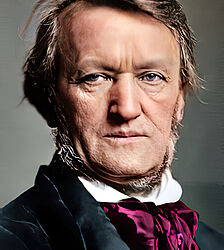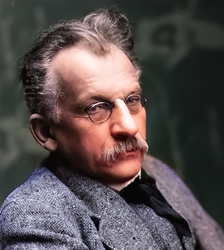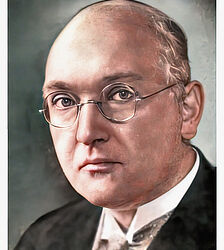Classical Music Radio in Wartime Britain
For better or worse, BBC radio was the dominant voice of Britain throughout WWII for which classical music was an important and revealing feature.

Under the Nazi regime, music was transformed from a source of artistic expression into a powerful tool of control and propaganda. This section looks at the Politics and Propaganda of music in Nazi Germany, exploring how the regime used music to manipulate public opinion, promote its ideology and demonise its enemies.
We examine the systematic censorship of 'degenerate' music, defined by its Jewish or 'non-Aryan' origins, and the promotion of music deemed 'folk music' to cement a unified national identity. We will also analyse the use of music in rallies, marches and radio broadcasts to stir nationalist fervour.

Wilhelm Richard Wagner (1813-1883) was one of the most significant figures in the history of opera whose music is tarnished by the composer's anti-semitism.

The composer Hans Pfitzner (1869-1949) saw himself as a defender of the German nation, its values, and its culture against a ‘degenerate’ and ‘corrupt’ France. During his denazification trial, along with Furtwängler, Egk and Strauss, he was found not guilty.

The composer Carl Orff (1895-1982) established a place for himself and his music within Nazi Germany. After WWII, he was placed on a blacklist, for denazification. However, he managed to clear his name with the help of an American friend.

Otto Klemperer (1885-1973) was a Jewish German-born conductor and composer, described as "the last of the few really great conductors of his generation." In April 1933, he fled to Austria, leaving his wife and children behind, to follow when he had secured a permanent residence.

Herbert von Karajan (1908-1989) was an Austrian conductor. He was principal conductor of the Berlin Philharmonic for 35 years. Generally regarded as one of the greatest conductors of the 20th century, he was a dominant figure in European classical music from the mid-1950s until his death.

Violinist and conductor Gustav Havemann (1882-1960) moved from being a modernist musician and friend of radical Jewish composers, to becoming a committed Nazi music ideologue and finally a fervent anti-fascist after the war.

Few are so mixed with debates around collaboration, passive resistance, and the tension between art and politics as Wilhelm Furtwängler (1886-1954). In 1933 he was 47, at the peak of his career and saw himself as defender of Germany’s musical heritage.

Clemens Heinrich Krauss (1893-1954) was an Austrian conductor and opera impresario, particularly associated with the music of Richard Strauss. Called ‘the most powerful man in German opera,’ and a ‘culture leader’, his career advanced significantly under the Nazi regime.

Musician Walter Starkie who set up 'El British' and met with General Franco to formalise cultural exchange between Britain and Spain. Starkie's efforts helped keep Spain neutral during WWII.

Dame Julia Myra Hess, DBE (1890-1965) was an English pianist, best known for her performances of the works of Bach, Mozart, Beethoven and Schumann. During WWII, she put on concerts at the National Gallery to raise morale.

After the Anschluss in 1938, Franz Schmidt (1874-1939) was named the greatest living composer in the Ostmark by the Nazis. At the premiere of his Das Buch mit Sieben Siegeln, it was reported that Schmidt made a Nazi salute.

Pianist Karlrobert Kreiten (1916-1943) was overheard saying Hitler was ‘brutal, sick and insane,’ by a Nazi sympathiser. He was executed by hanging. The day after his execution, his mother discovered her clemency plea had been accepted.

Jack Hylton (1892-1965) and his band made regular tours in Germany during the 30s when Nazis were banning jazz music. During WWII, Jack Hylton and His Orchestra disbanded, having out-sold every other band in Europe.

Charlie and his Orchestra were a Nazi-sponsored German propaganda swing band. They chose to play jazz standards that were popular with English listeners but with modified lyrics. This musical form of propaganda contributed to the spread of Nazi ideology and conveyed a defeatist message in the ranks of the Nazi enemy, British or American.

A troubling story of one French musician is that of the singer Maurice Chevalier. His case will always draw suspicion, but it also highlights the difficult situation experienced by many musicians in wartime France, who simply could not avoid getting entangled in the political crisis.

Edith Piaf (1915-1963) was not a devoted Resistance fighter. Her career was her first priority, and she clearly felt some compassion towards the Nazis, some of whom had been her fans. All in all, it seems that she made the most of the situation.

Marie Magdalene "Marlene" Dietrich was a German-American actress and singer. Throughout her long career, which spanned from the 1910s to the 1980s, she continually reinvented herself. In 1920s Berlin, Dietrich acted on the stage and in silent films.

Salim Halali was a singer who became known for his traditional Arab-Andalusion music and as an iconic figure of French-Arab cabaret music. He survived in France under fake papers as a Muslim.

Alfred Rosenberg (1893-1946) wrote Der Mythus des 20. Jahrhunderts (The Myth of the 20th Century) in 1934, which argued for the supremacy of the 'Aryan' race and the threat posed by Jews. He was found guilty of crimes against humanity and executed.

Hans Joachim Moser (1889-1967) blamed America and the Jews for commercialising music. His commitment to celebrating Germany won him Nazi approval and was promoted to general secretary of the Ministry of Propaganda.

Herbert Gerigk’s (1905-1996) Lexikon der Juden in der Musik was so popular that by 1943 thousands of copies were circulating throughout the German Reich. Even within the framework of Nazi ideology Gerigk was known as being particularly conservative and critical.

Author of the 1939 book Mendelssohn, Meyerbeer, Mahler: Three Chapters of Jewry in Music as the Key to Music History of the 19th Century, established Karl Blessinger's (1888-1962) reputation as one of the most prominent anti-Semitic musicologists of the Third Reich.
For better or worse, BBC radio was the dominant voice of Britain throughout WWII for which classical music was an important and revealing feature.
The modern nation of Italy had existed for barely more than sixty years when, in October 1922, Benito Mussolini became the country’s prime minister.
Explores the coupling of visual and musical symbolism, focusing on how the film Jojo Rabbit uses popular music and visual and vocal icons of the Holocaust.
Karl Amadeus Hartmann was a socialist German composer active during both world wars. He studied under a number of leading musicians, including Joseph Haas (who
Music was not simply another art form in the Third Reich. In the Nazi imagination, music had a unique significance and power.
On 13 February 1934 the composer Richard Strauss gave a speech celebrating one of the central cultural institutions of the Third Reich: the Reichskulturkammer.

Du kleiner Kasten, den ich flüchtend trug,
Daß meine Lampen mir auch nicht zerbrächen,
Besorgt vom Haus zum Schiff, vom Schiff zum Zug,
Daß meine Feinde weiter zu mir sprächen,
An meinem Lager und zu meiner Pein,
Der letzten nachts, der ersten in der Früh,
Von ihren Siegen und von meiner Müh:
Versprich mir, nicht auf einmal stumm zu sein!
Oh, you little box I carried as I fled
Carefully so that no valve breaks
Fleeing from house to train, from train to ship
So that my enemies might still address me.
At my bedside and to torment me
From dawn until last thing at night,
Shouting their victories and my worst fears:
Promise at least you won't go silent again!

Und es sind die finstern Zeiten in der anderen Stadt.
Doch es bleibt beim leichten Schreiten und die Stirn ist glatt.
Harte Menschheit, unbewegt, lang erfror'nem Fischvolk gleich.
Doch das Herz bleibt schnell geregt und das Lächeln weich.
And there are dark moments in the foreign city
But we keep the step light, and the forehead is smooth
Hard and impassive humanity, like fish frozen by the cold
But the heart always beats fast and the smile stays sweet